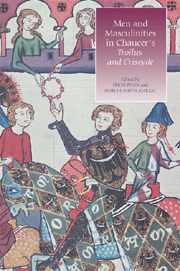Book contents
- Frontmatter
- Contents
- Contributors
- Abbreviations
- Introduction: The Myths of Masculinity in Chaucer's Troilus and Criseyde
- 1 “Beautiful as Troilus”: Richard II, Chaucer's Troilus, and Figures of (Un)Masculinity
- 2 The State of Exception and Sovereign Masculinity in Troilus and Criseyde
- 3 Revisiting Troilus's Faint
- 4 What Makes a Man? Troilus, Hector, and the Masculinities of Courtly love
- 5 Masculinity and Its Hydraulic Semiotics in Chaucer's Troilus and Criseyde
- 6 Masochism, Masculinity, and the Pleasures of Troilus
- 7 “The Dreams in Which I'm Dying”: Sublimation and Unstable Masculinities in Troilus and Criseyde
- 8 “A Mannes Game”: Criseyde's Masculinity in Troilus and Criseyde
- 9 Troilus's Gaze and the Collapse of Masculinity in Romance
- 10 Sutured Looks and Homoeroticism: Reading Troilus and Pandarus Cinematically
- 11 Being a Man in Piers Plowman and Troilus and Criseyde
- 12 “The Monstruosity in Love”: Sexual Division in Chaucer and Shakespeare
- Index
- CHAUCER STUDIES
3 - Revisiting Troilus's Faint
Published online by Cambridge University Press: 12 September 2012
- Frontmatter
- Contents
- Contributors
- Abbreviations
- Introduction: The Myths of Masculinity in Chaucer's Troilus and Criseyde
- 1 “Beautiful as Troilus”: Richard II, Chaucer's Troilus, and Figures of (Un)Masculinity
- 2 The State of Exception and Sovereign Masculinity in Troilus and Criseyde
- 3 Revisiting Troilus's Faint
- 4 What Makes a Man? Troilus, Hector, and the Masculinities of Courtly love
- 5 Masculinity and Its Hydraulic Semiotics in Chaucer's Troilus and Criseyde
- 6 Masochism, Masculinity, and the Pleasures of Troilus
- 7 “The Dreams in Which I'm Dying”: Sublimation and Unstable Masculinities in Troilus and Criseyde
- 8 “A Mannes Game”: Criseyde's Masculinity in Troilus and Criseyde
- 9 Troilus's Gaze and the Collapse of Masculinity in Romance
- 10 Sutured Looks and Homoeroticism: Reading Troilus and Pandarus Cinematically
- 11 Being a Man in Piers Plowman and Troilus and Criseyde
- 12 “The Monstruosity in Love”: Sexual Division in Chaucer and Shakespeare
- Index
- CHAUCER STUDIES
Summary
Because there is neither an “essence” that gender expresses or externalizes nor an objective ideal to which gender aspires, and because gender is not a fact, the various acts of gender create the idea of gender, and without those acts, there would be no gender at all. Gender is, thus, a construction that regularly conceals its genesis; the tacit collective agreement to perform, produce, and sustain discrete and polar genders as cultural fictions is obscured by the credibility of those productions – and the punishments that attend not agreeing to believe in them.
Judith Butler, Gender TroubleWith a crash that shattered the last manifestations of the notion that some inner core renders human beings male or female, an ancient concept of the self fell to the axe of Judith Butler, one of the most important theorists rewriting identity and sexuality today. Gender is the bedrock of personal identity in Butler's conception, but, jettisoning conventional notions altogether, she argues that it is the acts of gender and only the acts of gender that constitute its reality. Gender emerges from the repetition of such acts. It is constructed in and through that repetition, with each iteration altering slightly the act it enacts. No additional “essence” lies behind this performance. Gender is thus the product of the “reiterative power of discourse to produce the phenomena that it regulates and constrains.” People, speaking subjects, “I's” emerge only as always already gendered, as already existing within gender relations, where those relations are themselves the products of the utterances that constitute the substance of “gender” and “relation” in the first place.
- Type
- Chapter
- Information
- Publisher: Boydell & BrewerPrint publication year: 2008



